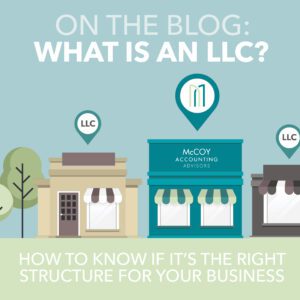What is an LLC? How to Know If It’s the Right Structure for Your Business
Starting your own business is both exciting and daunting. (And if we’re being honest, it can be a little confusing, too.) Figuring out how to structure your company is an important decision from a liability, tax, and overall management standpoint. So, over a series of articles, we’re diving in to explore two of the most common structures – LLCs and S Corps – to help you identify what works best for your business.

LLC basics
An LLC is a Limited Liability Company. Here’s the official definition from Investopedia: “An LLC is a business structure whereby the owners are not personally liable for the company’s debts or liabilities. LLCs combine the characteristics of a corporation with those of a partnership or sole proprietorship.”
LLCs are subject to state regulations and are fairly flexible when it comes to how they’re managed. There are typically no limits on how many owners (called members) an LLC can have, and the structure works whether your business is a one-person company or grows to include hundreds of employees. Plus, an LLC can be member-managed by the owners themselves or manager-managed by someone the members bring in from the outside.
By forming an LLC, you limit your personal liability, and you gain options for how the business is taxed. Take a look at these potential advantages.
Limit your liability
Limiting your liability helps to protect your personal assets from business debts and claims. For example, if the business isn’t able to pay a vendor or lender, LLC members’ personal assets – like your car or your home – are off-limits when the creditor seeks to collect. The LLC limits your liability to the money you’ve invested in the business.
It’s important to note that an LLC limits your liability except in the following situations:
- if you personally guarantee a business loan or debt that the business later defaults on,
- if you do something illegal or fraudulent that harms someone or the business itself, or
- if you fail to treat the LLC as a separate business entity.
That last point is critical. Don’t mix your LLC and personal finances. Use the federal employer identification number (EIN) assigned through your LLC filing and open a separate business-only checking account. You should also create an operating agreement document for your LLC, which outlines and formalizes it as a separate entity.
Understand your tax options
When it comes to taxes, an LLC is considered a “pass-through entity” by the IRS, similar to sole proprietorships and partnerships. That means the business income (or loss) “passes through” to the LLC’s owners to be reported on their individual income tax returns.
In other words, the LLC itself doesn’t pay federal taxes. For sole-owner LLCs, the owner simply reports the company’s profits or losses as part of their 1040 tax return. Co-owned LLCs file a Form 1065, which is an informational return that shows each LLC member’s share of the income (or losses) for the year. The IRS uses this information to confirm that the LLC members are reporting their income correctly. (Note: Some states may require an LLC to pay a tax or annual fee. Check your state regulations and factor that into your LLC decision-making process.)
The IRS considers LLC owners as self-employed rather than employees of the LLC. That means in place of tax withholding, each LLC owner must make quarterly estimated tax payments (both federal and state (when applicable)). Business owners are also responsible for paying “self-employment taxes” to cover their Social Security and Medicare contributions. Like sole proprietors and business partnerships, LLC owners pay twice as much self-employment tax compared to employees because there is no employer to match the contributions. However, LLC owners may deduct half of the total from their taxable income.
In some situations, LLC owners may elect to be taxed as an S Corporation to save money. For more on S Corps, please see the next article in this series.
How to form an LLC
The process for setting up an LLC is relatively simple and requires less documentation and administration compared to other options. Typically, you file an “articles of organization” form with your state that provides the basic information about your company.
McCoy Accounting Advisors can help you evaluate your options and determine the right structure for your business. Contact us to learn more about our Business Advisory Services and schedule a complimentary consultation.


